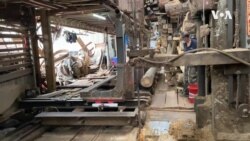For the past 40 years, Wong Hung-kuen and his two siblings have owned Chi Kee Sawmill & Timber. Known as the “Last Sawmill in Hong Kong,” it now faces imminent eviction by the Hong Kong government.
The Wongs are the second generation to operate the business founded 75 years ago in Hong Kong’s North Point district. The business moved several times before 1982 when it settled into its current location in Kwu Tung near the border with China’s Shenzhen city.
It’s an area where Hong Kong authorities have been pushing development to address a chronic housing shortage.
The sawmill received an eviction notice in January 2019, according to the South China Morning Post, which said the Wongs faced a June 30 deadline.
They have not yet moved, and even though some local residents want to save the sawmill, the government is moving ahead with its plans.
A spokesperson for the Lands Department told the South China Morning Post: “The government had given more than a two years buffer to allow the sawmill to relocate itself” and the development plan can no longer be delayed.
He said that according to department records, the sawmill had not accepted the assistance the government offered for land planning consultation and mediation services.
Wong Hung-kuen, 74, and his siblings want a two-year grace period to allow them to process about 1,000 tons of timber they have on hand into furniture or artworks rather than sending it to landfills. That timber includes precious woods like camphor, used to make fine furniture and cabinetry.
“Authorities can take all the timber in dozens of trucks to the landfill … . This is the way they want to deal with the timber,” Wong told VOA Cantonese. “But we really hope to make good use of it and make the best use of it in nature.”
In addition to giving them more time to deal with their stock that includes wood recycled from local demolition sites, the family is also proposing to turn the sawmill into a museum to showcase traditional Hong Kong wood craftsmanship and the role it played Hong Kong’s past.
According to Wong, the philosophy behind the business includes prolonging the life of trees and turning them into useful wood.
"Especially wood, we must cherish it, because without trees, we animals can't have living space,” Wong said. “Trees have helped us a lot. It is most important for us to have an attitude of gratitude.”
Wong said that he and his siblings want the sawmill preserved rather than receiving compensation from the government. According to the South China Morning Post the government is offering HK$1,500 (US$191) per square foot to reclaim the land.
That, Wong told the South China Morning Post, is insufficient for a business so entwined with Hong Kong’s post-World War II history.
“If it’s destroyed, it is such a pity. … Why not preserve this? There are some (historical values) in here,” Wong told VOA Cantonese.
Wong hopes to stay in the wood factory as long as possible in part so he can continue teaching young people about uses for wood.
According to Ng Cheuk-hang, a volunteer in the anti-eviction effort, Chi Kee has held a woodworking classes every month since 2016. Lessons include identifying tree species, instruction in creating furniture and art using wood, and, most importantly, why the students must cherish wood and nature. Ng said that he helps teach the classes.
Despite being suspended during COVID-19 lockdowns, the class has been held at least 60 times so far and more than 1,000 people have participated, including those from the University of Manchester in the United Kingdom and Chinese University of Hong Kong.
According to Ng, Chi Kee wrote the Lands Department in February asking for leniency but received no response. He added that the company has been trying to find a new site but the one possibility turned out to be too expensive.
Ng said that for years, Chi Kee received wood from demolished sites from Hong Kong authorities and helped recycle it.
"It is actually a very strange situation,” Ng told VOA Cantonese. “On the one hand, the government continues to bring some wood, or these public institutions continue to bring some wood, and want us to deal with it, but on the other hand, it (the government) continues to take back our factory.”
















